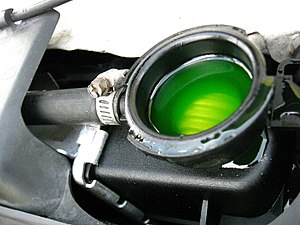Antifreeze
An antifreeze agent (colloquially: antifreeze ) is a substance (e.g. glycerine , ethylene glycol , ethanol ) that lowers the freezing point of another substance (e.g. water ). The antifreeze effect depends on the substance used and the concentration .
It is known to use as an additive for the cooling systems or in windscreen washer systems of motor vehicles . Concentrates are often sold that are mixed with water in a fixed ratio (if there is more antifreeze, the solution remains liquid under even lower temperature conditions).
In addition to glycols, small amounts of various additives are mixed in with high-quality antifreeze for motor vehicles. These substances also help against rust and overheating and have lubricating properties that protect the entire cooling system. A well-known brand name among engine coolants is Glysantin , a trademark of BASF since 1929 .
biology
“Anti-freeze agents” ( proteins ) are also produced by living things (e.g. sea wolves ), especially those from the arctic climate zones . Without them, they would run the risk of ice forming in their body fluids , which would destroy the cell membranes through perforation .
literature
- Wilfried Staudt: Handbuch Fahrzeugtechnik Volume 1. 1. Edition, Bildungsverlag EINS, Troisdorf, 2005, ISBN 3-427-04520-X
